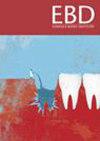牙周炎与轻度认知障碍有关系吗?
Q3 Dentistry
引用次数: 0
摘要
数据来源:本研究旨在确定牙周炎与轻度认知障碍之间的关系。为此,研究人员检索了不同的电子数据库,包括 PubMed、Scopus、Embase 和 Web of Science,以查找相关文献。此外,还对相关期刊进行了人工检索,以查找灰色文献:系统综述仅包括观察性研究。因此,检索了病例对照、队列和横断面研究。搜索策略基于 PECO 框架,其中包括牙周炎患者/无牙周炎患者和轻度认知障碍(MCI)患者/无轻度认知障碍患者的研究:共纳入了 7 项研究,并从这些研究中提取了数据,包括详细的文献资料、人口统计学数据、牙周炎数据、是否存在 MCI 等。然后使用临床参数和 I2 统计检验对提取的数据进行异质性评估。由于异质性较低,因此采用固定效应模型进行荟萃分析:结果:通过荟萃分析确定了牙周炎与 MCI 之间的关系,发现牙周炎患者 MCI 的发病率明显较高,OR = OR, 1.70 (95% CI: 1.24-2.32, p 结论:牙周炎与 MCI 之间的关系密切:牙周炎与 MCI 之间存在密切联系,表明牙周炎是 MCI 的危险因素之一。本文章由计算机程序翻译,如有差异,请以英文原文为准。
Does periodontitis have any association with mild cognitive impairment?
This study aimed at determining the association between periodontitis and mild cognitive impairment. For this, different electronic databases, including PubMed, Scopus, Embase and Web of Science, were searched for finding the relevant literature. In addition, hand searching of relevant journals was also done to find gray literature. The systematic review included observational studies only. Accordingly, case-control, cohort and cross-sectional studies were searched. The search strategy was based on PECO framework, wherein the studies which included patients with/without periodontitis and patients with/without mild cognitive impairment (MCI) were included. A total of 7 studies were included and the data from these studies and the data including bibliographic details, demographic data, data about periodontitis, presence of MCI etc. was extracted from the included articles. The extracted data, was then assessed for heterogeneity using clinical parameters and I2 statistical test. Owing to low heterogeneity, fixed-effects model was used for meta-analysis. Meta-analysis was done to determine the association between periodontitis and MCI and significantly higher incidence of MCI was found in patients with periodontitis OR = OR, 1.70 (95% CI: 1.24–2.32, p < 0.001). A subgroup analysis was done by including the studies comparing incidence of MCI in patients with severe periodontitis, which resulted in even stronger association with an OR of 2.09 (95% CI: 1.49–2.92, p < 0.001). Lastly, periodontal parameters, including CAL, PPD, and PI were compared amongst patients with/without MCI. Significant differences were observed for both CAL and PI, with worsening of values in patients with MCI. Observed mean difference for CAL and PI were 0.44 (95% CI: 0.12–0.75) and 0.72 (95% CI:0.50–0.93), respectively. NS differences were observed for PPD values with a mean difference of 0.21 and 95% CI as −0.08 to 0.49. Strong association between periodontitis and MCI was observed, indicating periodontitis to be a risk factor for MCI.
求助全文
通过发布文献求助,成功后即可免费获取论文全文。
去求助
来源期刊

Evidence-based dentistry
Dentistry-Dentistry (all)
CiteScore
2.50
自引率
0.00%
发文量
77
期刊介绍:
Evidence-Based Dentistry delivers the best available evidence on the latest developments in oral health. We evaluate the evidence and provide guidance concerning the value of the author''s conclusions. We keep dentistry up to date with new approaches, exploring a wide range of the latest developments through an accessible expert commentary. Original papers and relevant publications are condensed into digestible summaries, drawing attention to the current methods and findings. We are a central resource for the most cutting edge and relevant issues concerning the evidence-based approach in dentistry today. Evidence-Based Dentistry is published by Springer Nature on behalf of the British Dental Association.
 求助内容:
求助内容: 应助结果提醒方式:
应助结果提醒方式:


